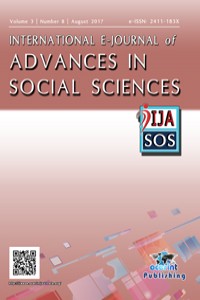Abstract
References
- De Jevenois, P. (1996). La Dirección General de Relaciones Culturales y Científicas 1946-1996, edit. Ministerio de Asuntos Exteriores, Madrid. Fernández, L. S., Pérez, D. R., Comellas, J. L. y Andrés-Gallego J. (1991). Historia General de España y América, La época de Franco, Ed. Rialp, Madrid. Gómez-Escalonilla, L. D., Figueroa, M. (2008). Los compromisos internacionales de España en materia de cultura, edit. Elcano Royal Institute of International and Strategic Studies, Madrid. Martínez, E. M., Roth, J. O. (2012). El discreto encanto de la cultura: Nuevas estrategias para la proyección exterior de la cultura: un enfoque práctico, edit. Ariel, Barcelona. Ybañez, E., Pascual, J. A., Castillo, A., Moreno, F., Otero, J. (1996). El peso de la lengua española en el mundo, edit. Universidad de Valladolid, Valladolid.
THE ROLE OF THE CERVANTES INSTITUTE IN THE IMPLEMENTATION OF THE CULTURAL POLICY OF SPAIN SINCE THE ESTABLISHMENT OF DEMOCRACY AND BEYOND
Abstract
The objective of the study is to highlight the action plan of
to further promote its cultural sector after the establishment of a democratic
regime which followed Franco's death in 1975.
comprehensive cultural plan with clear objectives and determine the means for
achieving it. We focus on the decisive initiative of the establishment of the
Cervantes Institute and discuss sectors of its action as well as how
and exploited the strong potential of Cervantes Institute. Our aim is to
investigate whether
having started a new chapter in its political history, exploited the power of
culture and implemented a new well-structured and active cultural strategy.
The Cervantes Institute was initially designed with an aim to map
and accurately record the state of the Spanish language all over the world, to
create access paths to native Spanish population in different countries and to
connect with them gaining their alliance and support. The essence and work of
the Cervantes Institute was certainly multidimensional and complex and was
strongly based on the cultural strength of the Spanish language which formed an
international, dynamic connection channel. However, there were several major
organizational inefficiencies and drawbacks which the Cervantes Institute
should overcome. After all, the successful implementation of the cultural
policy incarnated by the Cervantes Institute was an important bet not only for
the Institute but for the entire
In this context, we present and analyze in detail how
cultural policy highlighting the crucial role of the Cervantes Institute and
further discuss whether
eventually managed to achieve a leading role at an international level.
References
- De Jevenois, P. (1996). La Dirección General de Relaciones Culturales y Científicas 1946-1996, edit. Ministerio de Asuntos Exteriores, Madrid. Fernández, L. S., Pérez, D. R., Comellas, J. L. y Andrés-Gallego J. (1991). Historia General de España y América, La época de Franco, Ed. Rialp, Madrid. Gómez-Escalonilla, L. D., Figueroa, M. (2008). Los compromisos internacionales de España en materia de cultura, edit. Elcano Royal Institute of International and Strategic Studies, Madrid. Martínez, E. M., Roth, J. O. (2012). El discreto encanto de la cultura: Nuevas estrategias para la proyección exterior de la cultura: un enfoque práctico, edit. Ariel, Barcelona. Ybañez, E., Pascual, J. A., Castillo, A., Moreno, F., Otero, J. (1996). El peso de la lengua española en el mundo, edit. Universidad de Valladolid, Valladolid.
Details
| Journal Section | Research Article |
|---|---|
| Authors | |
| Publication Date | August 31, 2017 |
| Submission Date | September 7, 2017 |
| Published in Issue | Year 2017 Volume: 3 Issue: 8 |
Cited By
ÜLKE TANITIMINDA KÜLTÜREL DİPLOMASİNİN ÖNEMLİ BİR ARACI OLARAK ULUSAL KÜLTÜR ENSTİTÜLERİNİN ROLÜ
Pamukkale University Journal of Social Sciences Institute
https://doi.org/10.30794/pausbed.1228127
Contact: ijasosjournal@hotmail.com
The IJASOS Journal's site and its metadata are licensed under CC BY
Published and Sponsored by OCERINT International © 2015- 2025

